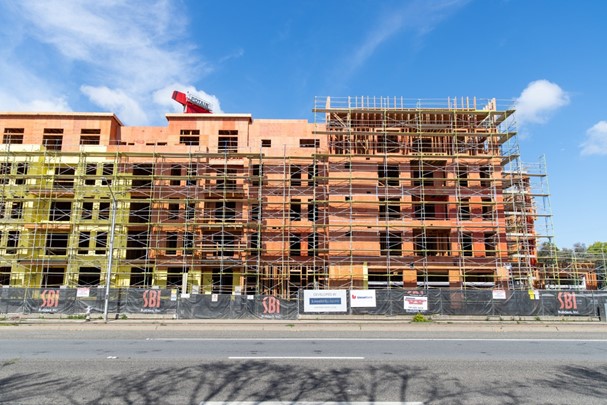Proposed legislation would apply to units produced through state’s density-bonus program
by Gennady Sheyner January 24, 2024 2:28 pm

An apartment complex under construction in the 2700 block of El Camino Real in Mountain View on April 8, 2020. Photo by Magali Gauthier.
Cities will no longer be able to tack on impact fees to housing units that developers produce through California’s density-bonus program under legislation proposed by state Assembly member Marc Berman, D-Menlo Park.
The bill, known as Assembly Bill 2063, would apply to a range of fees — including inclusionary zoning fees and in-lieu fees — that cities currently tack on to housing developments. Cities use these fees to bolster their affordable housing funds and support community services such as libraries and parks.
Cities are already prohibited from tacking on these fees to below-market-rate units in new housing developments. Berman’s bill would extend this prohibition to housing units created through the state’s density-bonus program, which allows residential developers who build affordable housing to get a density bonus of up to 50% density for their projects and which also allows them to receive waivers and concessions such as reductions in parking and setback requirements.
The topic of affordable housing fees has been divisive in Palo Alto, where the City Council moved in to raise the fees in 2016 from $20.37 to $60 per square foot, only to see newly elected members reverse that decision in early 2017 and set the fees at $35 per square foot. Last October, the council voted to raise fees to $68.50 per square foot, consistent with what Santa Clara County was seeking to impose on Stanford University as part of the university’s expansion plan (Stanford withdrew the plan in November 2019).
In a statement, Berman’s office said the bill will address a barrier to affordable housing production and strengthen California’s density bonus law.
“The intention of the California State Density Bonus was to incentivize building more onsite affordable housing,” Berman said. “However, tacking on additional fees undermines the intent of this law and can prevent desperately needed affordable housing from actually getting built.”
State Assembly member Marc Berman speaks at a press conference outside of the Ford Greenfield Labs in Palo Alto on Jan. 26, 2022. Photo by Magali Gauthier.
AB 2063 is one of two affordable housing bills that Berman has proposed in the days leading up to the Friday, Feb. 18, deadline for new legislation. Another bill, known as AB 2006, aims to streamline the application process by removing the need for affordable housing developers to report the same information about their projects to three different state agencies: the Department of Housing and Community Development, the California Housing Finance Agency and the California Tax Credit Allocation Committee.
Sponsored by the California Housing Consortium and the California Housing Partnership, AB 2006 would require the three state agencies to enter into a memorandum of understanding to ensure that only one entity will conduct physical inspections for a particular project, which eliminates the need for a developer to submit duplicate information to different entities and establishes a single process for projects to obtain the needed state approvals.
“By streamlining the oversight currently handled by multiple state housing agencies, this smart bill will make it less expensive and time-consuming for the state’s private sector partners to provide affordable homes for those in need,” Matt Schwartz, president and CEO of the California Housing Partnership, said in a statement.
Berman said the two bills aim to address California’s “dire shortage of affordable housing.”
“These two common-sense bills will remove barriers that delay critically needed affordable housing production,” Berman said in a statement. “The limited resources of our local affordable housing providers should be spent housing our most vulnerable neighbors, not filing unnecessarily duplicative paperwork with multiple state agencies or being spent on fees that prevent affordable housing from being built.”


